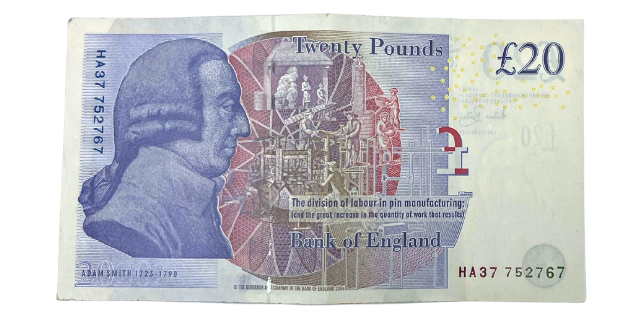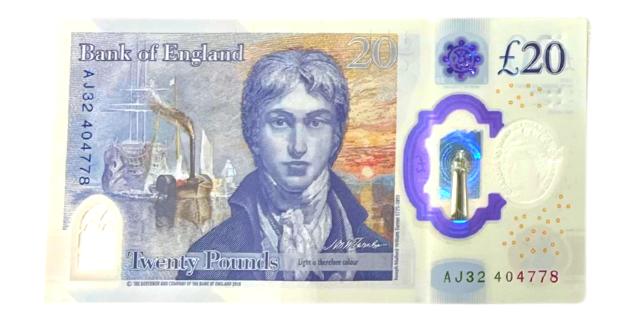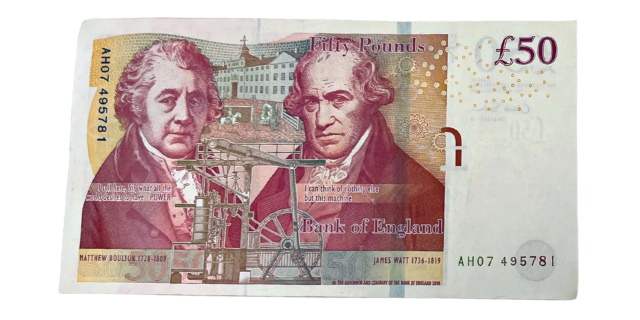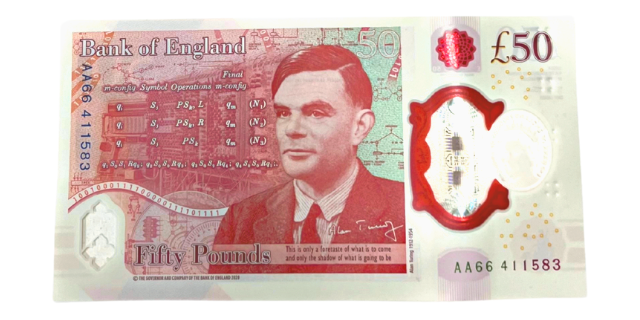The new notes feature new historical features from the UK.
£20 – From Economist to Artist.
The £20 note features a change from Adam Smith to JMW Turner.
OLD £20 NOTE
The previous paper currency featured Adam Smith – the Scottish 18th century economist, philosopher considered to be the father of modern economics.
Smith is famed for his 1776 book The Wealth of Nations, wherein he proposed his most prominent ideas – “the invisible hand” (when a person serves their own self-interest, it will unintentionally benefit greater society), and division of labour (we’re all sums of a whole, and high-volume production is more efficient when workers concentrate on one small, specialised aspect) – now foundational economic theories.
Smith is known for creating the concept of Gross Domestic Product (GDP)!
Fun Fact: Adam Smith ordered that upon death, all his unpublished works must be destroyed.
NEW £20 NOTE
The new note features 18th century Romantic artist Joseph Mallord William (JMW) Turner – often dubbed one of the great masters of painting.
Rather than a photograph, this new currency features JMW Turner’s self-portrait (painted circa 1799), alongside his famous work The Fighting Temeraire.
The new £20 note also features his quote “Light is therefore colour,” which references Turner’s innovative use of shading, light, colour and tone.
Fun Fact: In his lifetime, JMW Turner created more than 30,000 drawings and sketches, 2000 watercolour paintings, and 550 oil paintings.
TIP: Use Snapchat to see JMW Turner's famous painting The Fighting Temeraire come to life!
£50 – From Industrial Revolution to Technological (and Cultural!) Revolution
The £50 note features a change from Boulton & Watt to Alan Turing – the first recognised LGBTQ+ person to be featured on a UK banknote.
OLD £50 NOTE
The previous paper currency featured Boulton & Watt. Matthew Boulton was an entrepreneur who financed engineer James Watt’s invention: the steam engine.
Together, they made revolutionary changes to the efficiency of the steam engine – replacing the waterwheel and horse as the main source of power for British industry, which helped drive the Industrial Revolution.
Fun Fact: The metric unit of power is named after James Watt.
NEW £50 NOTE
Chances are, you’re reading this on a smartphone or laptop. In that case, you owe it to the genius of Alan Turing – featured on the new £50 banknote.
Alan Turing laid out the foundation for of all computer science, software engineering and artificial intelligence. He also broke the German Enigma Code during WWII – said to have shortened the war by two years, and claimed by Winston Churchill to be “the greatest single contribution to victory in the Second World War.”
His brilliant, pioneering accomplishments progressed society into the technological age we know today and saved countless lives. Some of his inventions (including his Bombe and ACE technical drawings) are celebrated on the new banknote, along with his 1949 Times newspaper quote “This is only a foretaste of what is to come and only the shadow of what is going to be.”
The tragic history: Alan Turing was openly gay in a time when homosexuality was illegal. Because of this, he was charged with “gross indecency” in 1952 and sentenced to the horrifying ordeal of chemical castration – as a result, he died by suicide in 1954.
A progressive future: After many years of campaigning, Alan Turing was finally posthumously pardoned in 2013. Progressive even in death, this led to what has been dubbed ‘Alan Turing’s Law’ in 2017, which pardons all men convicted under historical legislation outlawing homosexual acts.
Now, Alan Turing is the first LGBTQ+ figure to be featured on a UK banknote.
Fun Fact: The 2014 film The Imitation Game stars Benedict Cumberbatch as Alan Turing.
TIP: Use Snapchat to animate Alan Turing and the Bombe. Sound on. Trust us.


























